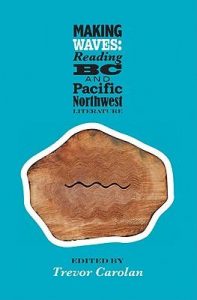by Ali Siemens (Contributor)
 UFV hit a milestone recently with the release of Making Waves: Reading BC and Pacific Northwest Literature, the first book from its new university press. The book, released in partnership with Anvil Press in Vancouver, was edited by UFV professor Trevor Carolan and features work by students, professors and literary veterans. Making Waves is a collection of essays that examines the different strains of BC and Pacific Northwest literature, especially its poetics. Moving from the birth of the creative writing department at UBC to appreciations of literature that focuses on the landscape of the Northwest, Making Waves is a collection that is timely and diverse in its grasp of the region’s literary traditions.
UFV hit a milestone recently with the release of Making Waves: Reading BC and Pacific Northwest Literature, the first book from its new university press. The book, released in partnership with Anvil Press in Vancouver, was edited by UFV professor Trevor Carolan and features work by students, professors and literary veterans. Making Waves is a collection of essays that examines the different strains of BC and Pacific Northwest literature, especially its poetics. Moving from the birth of the creative writing department at UBC to appreciations of literature that focuses on the landscape of the Northwest, Making Waves is a collection that is timely and diverse in its grasp of the region’s literary traditions.
Beyond its importance as the first book from UFV’s press, Making Waves is also significant as a showcase of some of the talent on campus: five of the essayists hang out here at UFV. Carolan and Hilary Turner are both English professors, and Ron Dart teaches Political Science. Alongside our professors, two students (and Cascade staffers), Paul Falardeau and Chelsea Thornton also contributed to the book.
Literature from the Northwest coast is a topic that has not always been at the forefront of many English specialists’ minds. However, to assume that the area’s literature does not contribute substantially to literature as a whole is appallingly incorrect, as the writers in Making Waves have offered their readers with the book’s multifaceted look into the many different avenues Northwest literature offers.
Each writer explores a different path that BC literature involves. Turner’s work, entitled Creators Versus Embalmers, focuses on the 1963 battle at UBC within the English department and the subsequent creation of the Department of Creative Writing. Dart offers a compelling essay about the history of Canada’s literary-politics. Carolan writes about Gary Snyder and the dream of building communities through Buddhist practice; a new world dharma translated into the twenty-first century. Falardeau talks about the Haida oral traditions and their significance to British Columbia literatures of the past and present, and Thornton discusses the differences and similarities between the inner and outer landscape, writing specifically within the context of Northern British Columbia.
Aside from the inclusion of UFV authors and their worthy contributions, there are several other praiseworthy entries, including Joseph Blake’s historic interview with the legendary P.K. Page, Judith Copithorne’s helpful recounting of Vancouver’s literary movements, Mike Doyle’s memoir like reflection about his connection to George Woodcock and former Vancouver Poet-laureate, George McWhirter’s Origins and Peregrinations, which also concerns itself with UBC’s creative writing department.
This is but a brief list of some of the fantastic work contained in Making Waves; the information contained in each piece is eye opening. The different voices that come out of each essay offer an intriguing look into the many different areas of literature in BC and the Northwest United States. This book will surely serve as a stepping stone for a more widespread appreciation of the regions talent.
Often blown away by the aptitude of writers outside of our home, we miss what is right under our nose. As Thornton writes, “We are awed by the Amazon, but we ignore the forests outside our cities.” Next time you are searching for a good book to take your mind off of the stresses of school, pick up Making Waves and get ready to gain more appreciation for the province we live in.


